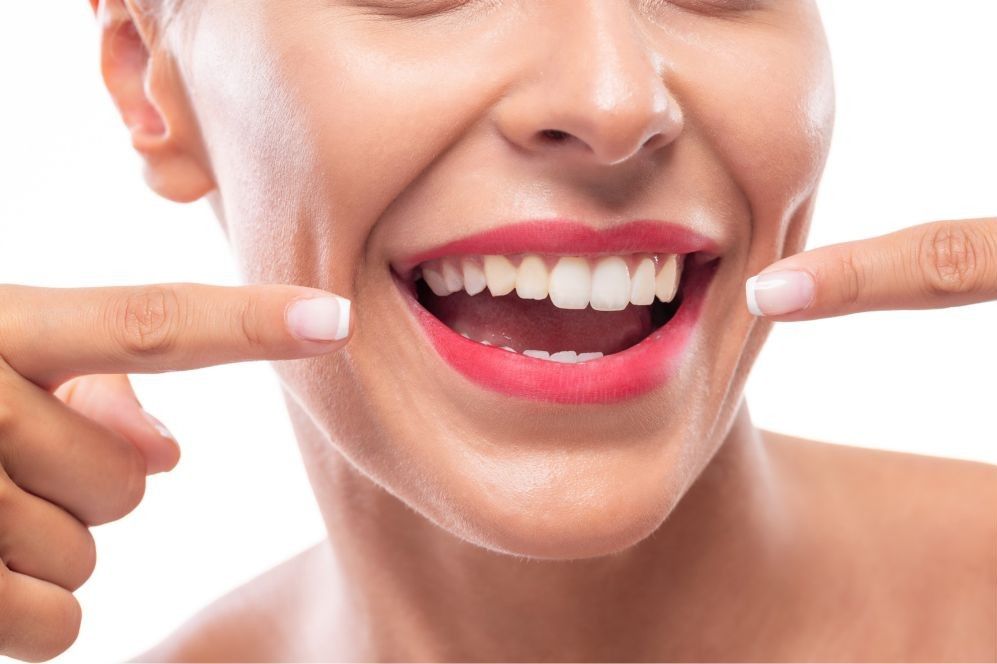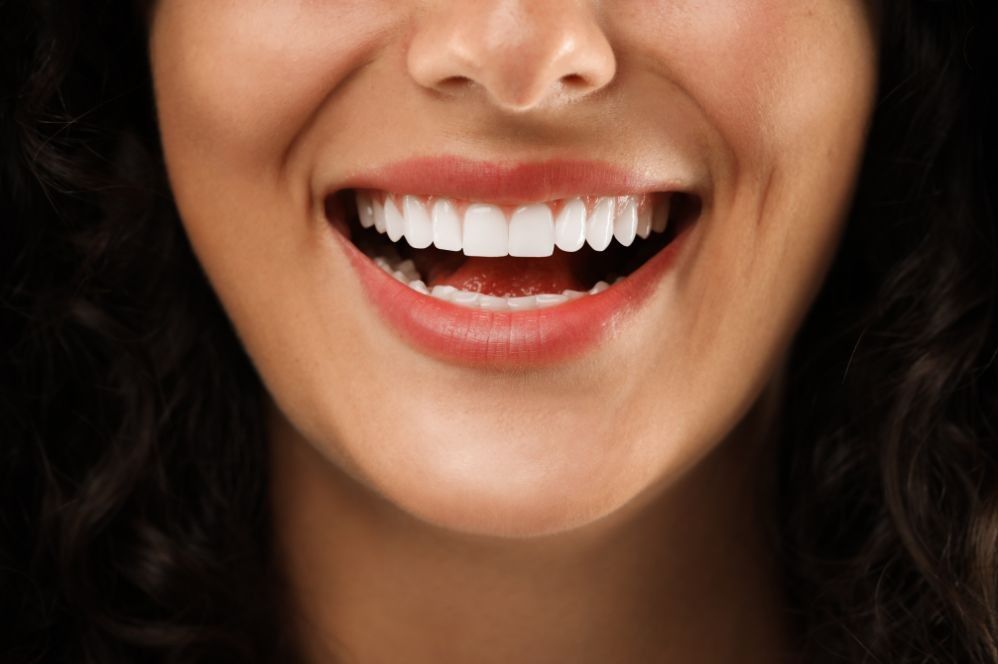Best Natural Teeth Whiteners? NYC Cosmetic Dentist Fact-Checks Home Remedies
Natural Teeth Whiteners: Do They Really Work? NYC Dentist Explains

Key Things to Know About Natural Teeth Whitening
| Question | Answer |
|---|---|
| Best Natural Teeth Whitener? | Good brushing and flossing! |
| Baking Soda? | Can help a little, but use toothpaste with it, not just baking soda alone. |
| Coconut Oil? | Might help clean teeth, but not a strong whitener. |
| Good Foods for White Teeth? | Apples, carrots, celery, cheese, yogurt. |
| Harmful "Natural" Whiteners? | Lemon, vinegar, charcoal – they can hurt your teeth! |
| When to See a Dentist? | Ask a dentist if you want really white teeth or natural things that don't work. |
Table of Contents
- Cleaning Teeth Well: The Best Natural Teeth Whitener
- Baking Soda and Coconut Oil: Can They Help Whiten Teeth?
- Yummy Foods That Help Your Teeth Get Whiter!
- Be Careful! Natural Things That Can Hurt Your Teeth
- Picking Good "Natural" Teeth Whitening Stuff
- When to Ask a Dentist About Teeth Whitening
- Questions People Ask About Natural Teeth Whitening (FAQ)

Why Do People Want to Whiten Their Teeth Naturally?
Hi, I'm Dr. Frederick Solomon, and I'm a cosmetic dentist in NYC who helps people get smiles they love. In my office at Tribeca Smiles, many people ask me about natural teeth whitening. It's a good question! Let's look at what works and what you must be careful about.
Cleaning Teeth Well: The Best Natural Whitener
The number one best way to naturally whiten your teeth is actually just keeping them really clean!
Think about it – if you have dirt on something, the first thing you do is wash it, right? It’s the same with your teeth.
When you eat and drink, tiny bits can stick to your teeth, making them look yellow or dull. This is called plaque and surface stains.
How to clean your teeth like a pro (and whiten them naturally!):
- Brush your teeth two times every day. Brush in the morning and before you go to bed. Use a soft toothbrush and brush gently for two minutes each time. Ensure you get all the spots – front, back, and chewing surfaces.
- Use toothpaste with fluoride. Fluoride is like a superhero for your teeth! It strengthens them and helps fight off yucky stuff that can stain them. Look for the ADA Seal of Acceptance on your toothpaste. This means it's good for you!
- Floss once a day. Flossing cleans between your teeth where your toothbrush can't reach. This helps remove plaque and food bits that can make your teeth look darker.
Expert Tip from Dr. Frederick Solomon: "I tell all my patients, young and old, that brushing and flossing is the foundation for a bright smile. It's not just about whitening; it's about healthy teeth. Think of it like washing your hands – you do it daily to stay clean and healthy, and it helps your smile too!"
Baking Soda and Coconut Oil: Can They Help Whiten Teeth?
You might have heard about baking soda and coconut oil for whitening teeth. Let's see what's true.
Baking Soda:
Baking soda is like a very, very gentle scrub. It can help rub off stains on the surface of your teeth. For this reason, many whitening toothpastes contain baking soda.
- Good: Baking soda is a mild cleaner.
- Not so good: Brushing with baking soda and water can be too rough if you do it too much. It also lacks fluoride, which protects your teeth from cavities.
Expert Advice from Dr. Frederick Solomon: "Using a toothpaste that contains baking soda is usually okay and can help with surface stains. But don't just brush with baking soda alone all the time. Using a toothpaste with baking soda and fluoride is better for the best cleaning and whitening."
Coconut Oil Pulling:
Oil pulling is an old trick from India. You swish coconut oil (sesame or sunflower oil) in your mouth for 15-20 minutes. Some people say it whitens teeth.
- Good: Swishing oil can help clean your mouth and eliminate yucky germs and plaque. Less plaque can mean less staining.
- Not so good: There's not a lot of strong science that says oil pulling really whitens teeth a lot. But, it can be good for your mouth in other ways.
Expert Opinion from Dr. Frederick Solomon: "Oil pulling with coconut oil is not going to give you super white teeth like professional whitening. But, it might help keep your mouth cleaner and healthier, and some people see a little whitening from it. Think of it as a bonus for your mouth, not a main way to whiten."
Yummy Foods That Help Your Teeth Get Whiter!
Guess what? Some of your favorite healthy foods can actually help keep your teeth whiter!
Foods that are like natural toothbrushes:
- Apples, Celery, and Carrots: These crunchy fruits and veggies are like scrub brushes for your teeth! When you chew them, they help rub off plaque and stains. They also make you make more spit (saliva), which washes away bad stuff in your mouth.
- Strawberries: Strawberries contain malic acid, a natural cleaner that can help prevent stains from sticking to teeth.
Foods that protect your teeth:
- Onions: Yes, onions! They contain substances that can prevent plaque from forming on teeth.
- Nuts and Seeds: Like crunchy fruits and veggies, nuts and seeds are a bit rough. This helps scrub your teeth and remove surface stains.
- Dairy like Cheese and Yogurt: Cheese and yogurt contain calcium and other nutrients that strengthen teeth. Strong teeth are less likely to get stained.
Expert Food Tip from Dr. Frederick Solomon: "Eating healthy foods isn't just good for your body, it's great for your smile too! Think of crunchy fruits and vegetables as natural cleaners, and dairy as teeth strengtheners. A healthy diet is a big part of keeping your smile bright."
Protect Your Teeth: Natural Whiteners to Use with Caution (or Avoid!)
Some "natural" teeth whitening ideas can actually be bad for your teeth. It's important to know which ones to stay away from.
Things to AVOID for whitening:
- Acidic Fruits like Lemon, Orange, and Vinegar: Some people say to rub lemon or orange peels on your teeth or rinse with vinegar. DON'T DO IT! These things are very acidic. Acids can eat away at the hard outside of your teeth, which is called enamel. If you lose enamel, your teeth can become sensitive and get cavities more easily.
Expert Warning from Dr. Frederick Solomon: "Acid is the enemy of your tooth enamel! While a little bit of fruit is okay to eat, rubbing acidic fruits or using vinegar directly on your teeth is a big no-no. It can cause real damage over time."
- Activated Charcoal: Charcoal is black powder that some people use to brush their teeth, thinking it will whiten them. There's no good science that says it works, and charcoal can be too rough and scratch enamel.
Expert Advice from Dr. Frederick Solomon: "Activated charcoal is a trend right now, but it's not proven safe or effective for whitening teeth. It can be abrasive and might even make your teeth look darker over time if it gets stuck in tiny cracks in your enamel. It's best to skip this one."
- Turmeric: Turmeric is a yellow spice. Even though it's good for your body in some ways, it will NOT whiten your teeth. In fact, turmeric can stain things yellow, like clothes!
Expert Fact from Dr. Frederick Solomon: "Turmeric is great in food, but not for whitening teeth. It's a strong dye, and there's no reason to think it would make your teeth whiter."
Choosing Safe & Effective Natural Teeth Whitening Products
If you go to the store, you'll see lots of toothpastes and powders that claim to be "natural" whiteners. Some of these can be okay to use, but knowing what to look for is good.
Ingredients you might see in "natural" whitening products:
- Baking Soda: We talked about this already! It's a mild cleaner.
- Coconut Oil: Also talked about! Might help clean your mouth.
- Essential Oils: (like peppermint, tea tree, spearmint): These oils can make your toothpaste taste good and fresh. Some might help fight germs in your mouth.
- Mineral Clay: This can be a gentle cleaner.
- Sea Salt: A little bit of salt can be okay for cleaning.
- Hydroxyapatite: This is a natural mineral that teeth are made of! It can help make teeth stronger.
Things to look for when choosing a "natural" whitening product:
- ADA Seal of Acceptance: This is still important! Even if it says "natural," look for the ADA Seal. This means the product has been checked for safety and works.
- Fluoride: Fluoride is still your friend! Fluoride is essential for healthy, strong teeth even if you want a "natural" toothpaste.
Expert Product Advice from Dr. Frederick Solomon: "When looking at 'natural' whitening toothpastes or powders, read the ingredients. Look for things like baking soda and fluoride. And always check for the ADA Seal. If you're unsure if a product is good, ask your cosmetic dentist!"
When to Ask a Dentist About Teeth Whitening
Natural teeth whitening methods mostly clean surface stains and keep your teeth healthy. They might make your teeth a bit whiter, but they won't give you a super bright white smile like in magazines.
When natural whitening might not be enough:
- If you want really white teeth: If you want to whiten your teeth a lot, natural methods might not be strong enough.
- For deeper stains: Some stains are inside your teeth, not just on the surface. Natural methods won't work on these kinds of stains.
- If you've tried natural methods that don't work: Everyone's teeth are different. What works for one person might not work for another.
Expert Recommendation from Dr. Frederick Solomon: "If you're serious about whitening your teeth and want to see a big difference, the best thing to do is talk to your dentist. We have professional whitening treatments that are safe and much more effective than anything you can do at home. We can also ensure your teeth are healthy before you start whitening."
Learn more about Cosmetic Dentistry at Tribeca Smiles or about KOR Whitening, which is a very effective whitening treatment we offer.
Questions People Ask About Natural Teeth Whitening (FAQ)
Q: Will brushing harder make my teeth whiter faster?
A: No! Brushing too hard can hurt your gums and enamel. Brush gently for two minutes, twice a day.
Q: Can I use lemon juice to whiten my teeth occasionally?
A: No, it's not a good idea. Even a little bit of acid can damage your enamel over time.
Q: Are "natural" whitening toothpastes always safe?
A: Most are safe with the ADA Seal of Acceptance and fluoride. Always check the label and ask your dentist if you're not sure.
Q: How long does it take to see results from natural teeth whitening methods?
A: It's different for everyone. Good cleaning habits will help keep your teeth looking their best over time. For more noticeable whitening, you might need professional treatment.
Q: Is professional teeth whitening expensive?
A: The cost of professional whitening can vary. But, it's often more effective and faster than natural methods. You can talk to your dentist about the cost and options like
KOR Whitening to see if it fits your budget.
Final Expert Thought from Dr. Frederick Solomon, a Cosmetic Dentist in NYC
"Taking care of your teeth naturally is a great start to a brighter smile!
Focus on good cleaning habits and a healthy diet. And if you want to whiten your teeth more,
don't be afraid to ask your dentist for advice. We're here to help you get a healthy and beautiful smile!"


